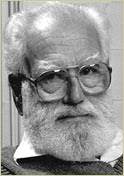
Arthur Kantrowitz
(1913-2008)
Former Member of the National Space Society Board of Governors
Arthur Kantrowitz was Professor Emeritus of Engineering at Dartmouth College. He devoted a lifetime to grappling with hard research questions. Among them: magnetically contained fusion; the invention of supersonic high intensity molecular beams; high temperature shock tubes, which provided the scientific basis for reentering the atmosphere from space; the world’s first successful demonstration of magnetohydrodynamic power generation; high-energy lasers and laser propulsion to Earth orbit; and cardiac assist devices which culminated in the intra-aortic balloon pump, used in hundreds of thousands of patients.
Dr. Kantrowitz earned his B.S., M.A., and Ph.D. degrees in physics at Columbia University. He taught aeronautical engineering and engineering physics at Cornell for ten years, and then founded and was CEO of the Avco Everett Research Laboratory. He held 21 patents and authored or co-authored some 200 scientific and professional papers and articles. He served as director of the Hertz Foundation and a member of the advisory board to television’s popular Nova program. He served on advisory boards to the Ford White House, the Department of Commerce, NASA, the General Accounting Office, and the National Science Foundation.
Kantrowitz was a fellow of the American Academy of Arts and Sciences, American Association for the Advancement of Science, American Astronautical Society, American Institute of Aeronautics and Astronautics (an honorary fellow), American Physical Society, American Institute for Medical and Biological Engineering, National Academy of Engineering, National Academy of Sciences, and International Academy of Astronautics. In 1953-1954, he held both Fulbright and Guggenheim Fellowships at Cambridge and Manchester Universities.
Dr. Kantrowitz proposed and tried to develop Scientific Adversary Procedures, also known as the “Science Court,” designed to provide a more reliable source of what science knows, and especially what science doesn’t know, when that information is needed for the making of public policy.







